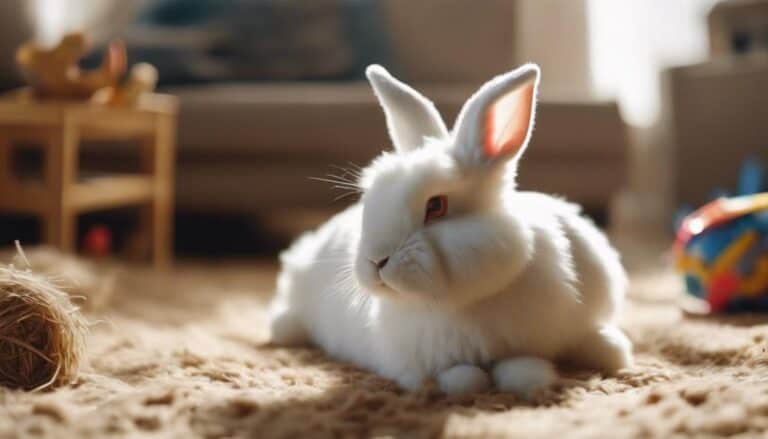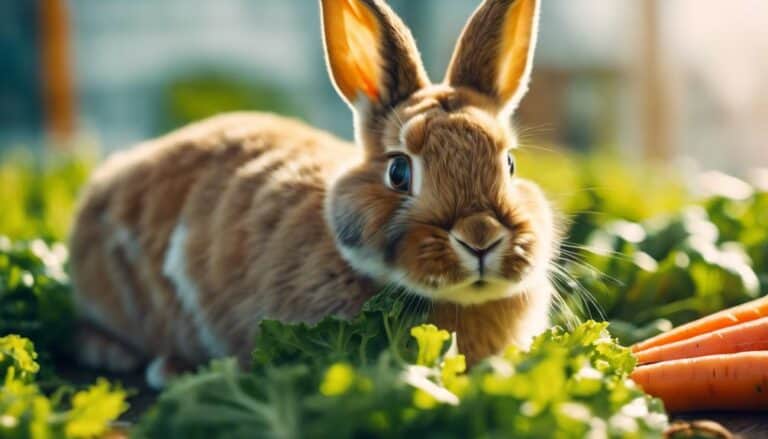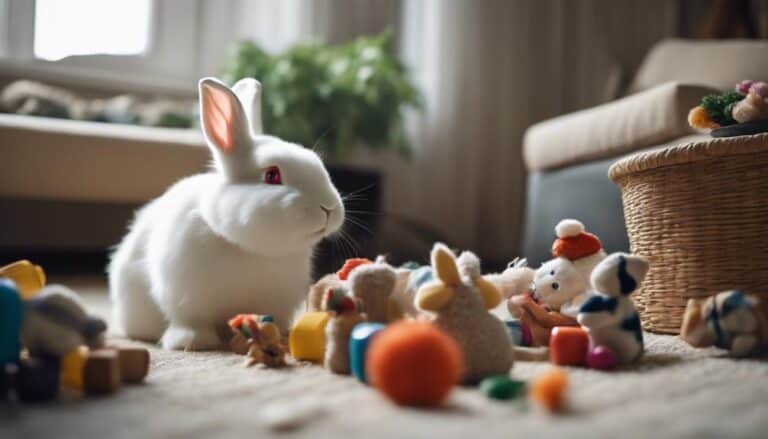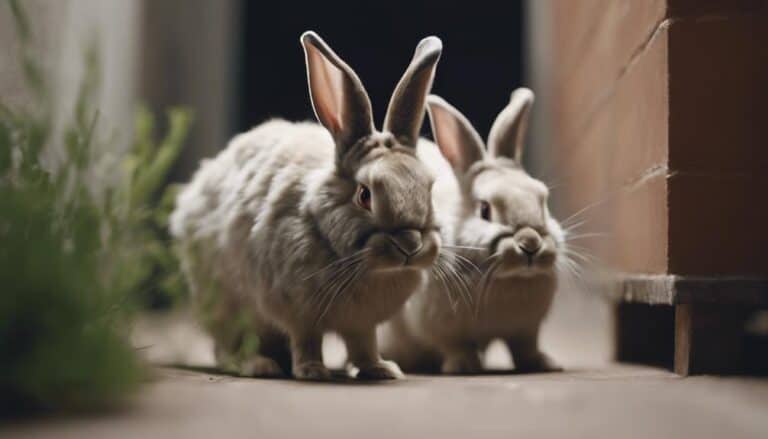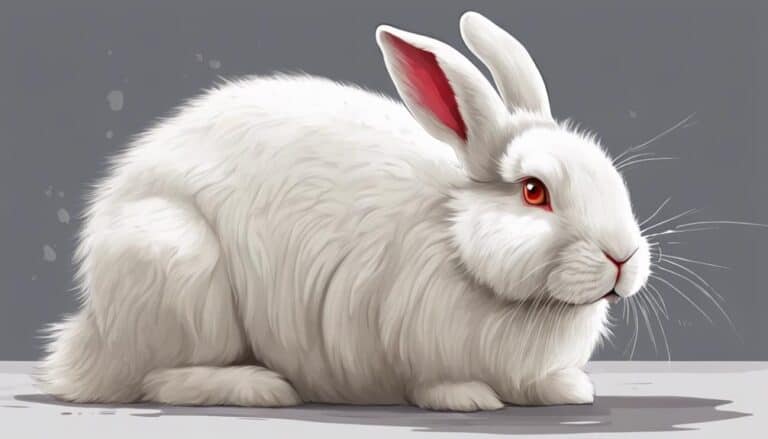If you have a bunny, you'll notice that they poop quite frequently, usually around 200 to 300 times a day. This high pooping rate is important for keeping an eye on your bunny's health. Things like their size, diet, and how active they are can affect how often they go to the bathroom.
By checking out your bunny's poop, you can spot any potential health issues early on. Paying attention to the characteristics of their poop can help you understand how their digestive system is doing. If you see any changes in their poop, it could be a sign of an underlying problem. Knowing your bunny's pooping habits well is vital for making sure they stay healthy.
Contents
- 1 Key Takeaways
- 2 Frequency of Bunny Pooping
- 3 Factors Affecting Bunny Poop Frequency
- 4 Monitoring Bunny Poop for Health
- 5 Bunny Diet and Poop Production
- 6 Normal Bunny Poop Characteristics
- 7 Signs of Abnormal Bunny Poop
- 8 Seeking Veterinary Care for Bunny Poop Issues
- 9 Frequently Asked Questions
- 10 Conclusion
Key Takeaways
Bunnies poop a lot, like around 200-300 times every day. Yup, it's a normal bunny thing. Their poop frequency can actually tell you a lot about how healthy they are. So, keep an eye on those poop piles!
What goes in must come out, right? The amount of poop your bunny produces can vary based on what they eat, how big they are, and how active they are. It's like a little digestive system check-in every time they go.
By keeping an eye on their poop habits, you can catch any potential health issues early on. Any changes in their poop frequency could be a sign that something's up and it's time for a trip to the vet. So, don't be shy about checking out their poop—it's for their own good!
Frequency of Bunny Pooping
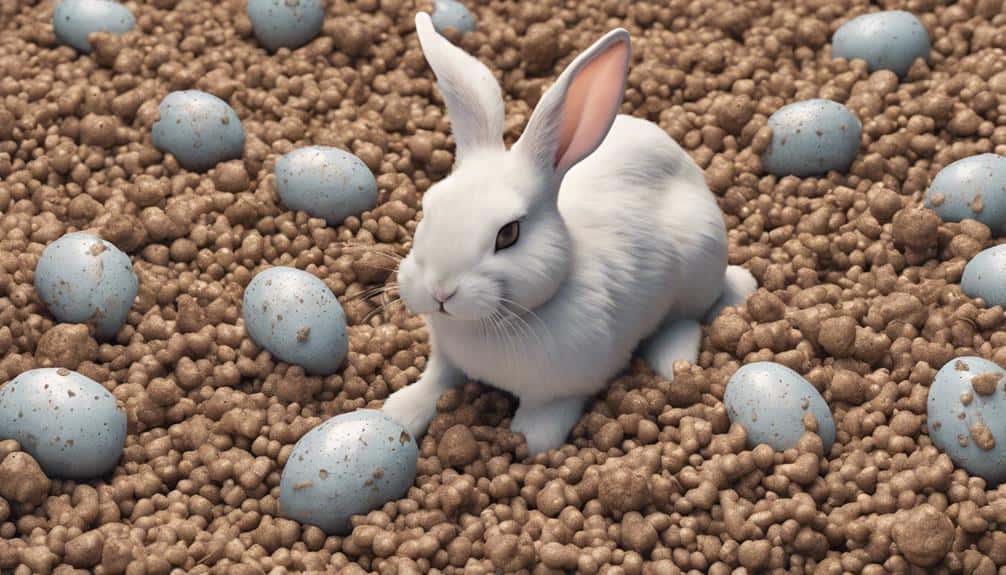
Do you know how often bunnies poop? Well, bunnies usually poop around 200 to 300 times a day, no matter how big or small they are. This consistent pooping frequency is super important for bunny owners to keep an eye on. It's not just about cleaning up after them, but it's also a key indicator of their overall health.
By paying attention to how many times your bunny poops each day, you can establish what's normal for them. Any big changes in their poop frequency could be a sign of underlying health issues that need to be addressed. So, keeping track of your bunny's poop habits is essential for catching any potential problems early on.
Factors Affecting Bunny Poop Frequency
Factors that affect how often bunnies poop include their size, diet, and how active they are. Generally, smaller bunnies may poop less than larger ones, but a healthy bunny typically poops around 200-300 times a day.
Diet is key when it comes to a bunny's poop schedule. Bunnies need a diet rich in fiber, like hay and fresh greens, to keep their digestion in check and ensure regular poops. If their diet suddenly changes, it can mess with their poop frequency, causing irregularity or fewer droppings.
How much a bunny moves around also plays a role in their pooping habits. Active bunnies tend to have more consistent bowel movements than those who lounge around a lot.
Factors like stress, sickness, or not drinking enough water can throw off a bunny's poop routine too. Keeping an eye on how often your bunny poops is important because changes could signal health issues that need a vet's attention. By knowing these factors, you can help your bunny stay healthy and happy.
Monitoring Bunny Poop for Health
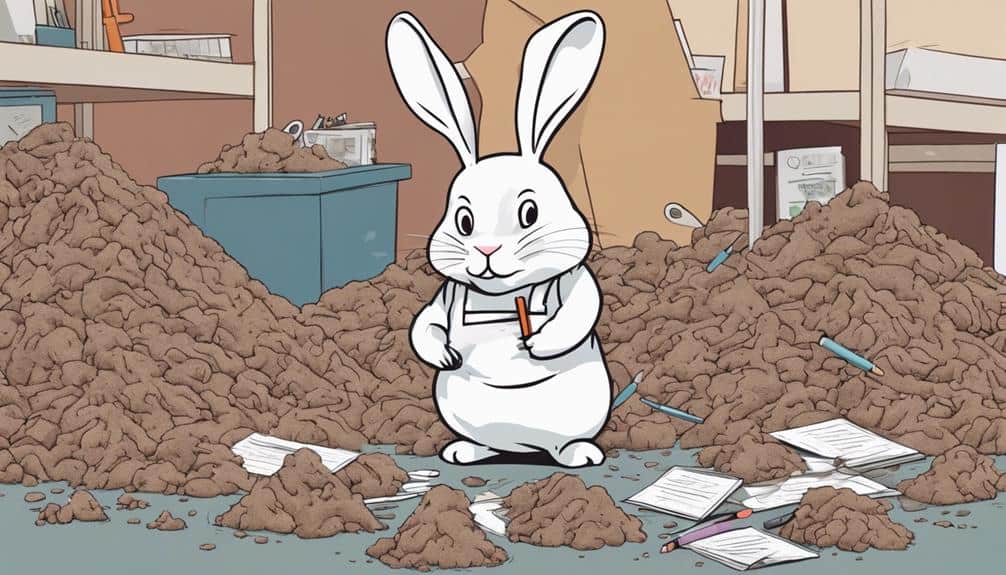
Monitoring your bunny's poop regularly is important for keeping an eye on its health and digestion. Bunny poop usually comes in two forms: hard, dry fecal pellets and soft, sticky cecotropes. Having both types in their poop is a good sign that their digestive system is working well. Checking your bunny's poop every day helps you establish what's normal for them, so you can easily notice any changes that might indicate health issues. If you see differences in poop frequency or consistency, it could be an early sign of problems, and you might need to take a closer look or visit the vet.
Examining the content of the fecal pellets, especially for chewed hay, can give you an idea of how well your bunny is digesting food and how healthy they're overall. By monitoring how much cecotropes your bunny consumes and produces, you can make sure they're getting all the necessary nutrients and maintaining a healthy digestive system. Paying attention to these details can help you take better care of your furry friend's health.
Bunny Diet and Poop Production
Bunnies have a special way of digesting their food, which means they make 200-300 poop pellets every day.
To keep their poop regular and healthy, it's important for bunnies to eat lots of hay and grass.
If you switch up their diet, it can affect how often they poop and the quality of their poop.
Bunny Digestive System
Rabbits have a pretty cool way of breaking down their food to get all the good stuff out of it. Their digestive system is like a sorting machine, separating the stuff they can digest from the fiber they can't. The fiber ends up as those little 'cocoa puffs' poops you might see around.
But here's where it gets interesting – rabbits have this special process where the digestible parts of their food get fermented in a part of their gut called the caecum. After that, these fermented bits get turned into cecotropes, which the rabbit eats again to squeeze out every last nutrient. It's like recycling their food for maximum nutrition!
To keep your bunny in top shape, it's important to understand how their digestive system works. By feeding them a diet that's high in fiber, you're helping them out big time. This fiber-rich diet supports their digestion and keeps everything running smoothly. So, next time you're feeding your rabbit, remember to give them the good stuff that keeps their digestive system happy and healthy!
Fecal Pellet Characteristics
Observing your rabbit's poop is a vital part of keeping them healthy. Rabbits usually make around 200-300 poop pellets every day. The size, shape, and color of these pellets can tell you a lot about your bunny's diet and how they're feeling. A diet that's high in fiber, like hay, helps your rabbit make healthy poop pellets.
It's important to keep an eye on how often your bunny is pooping and what their poop looks like. Changes in the consistency or frequency of their poop could be a sign of health issues that need attention. By watching your rabbit's poop closely, you can get a good idea of how their digestive system is doing and how healthy they're overall.
Normal Bunny Poop Characteristics
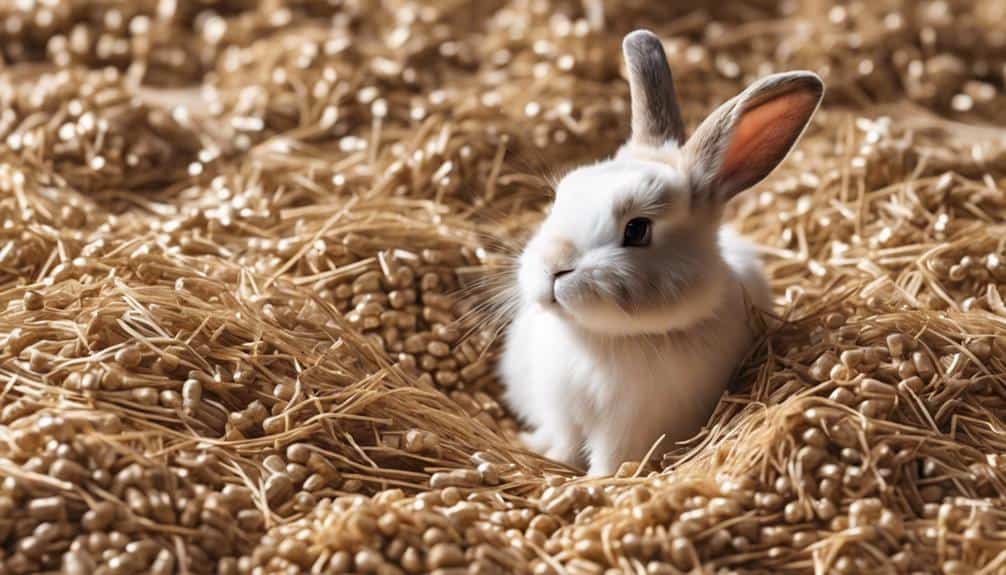
Keeping an eye on your bunny's poop can tell you a lot about their digestive health. A healthy rabbit will poop around 200-300 times a day, and their poop should be similar in size, round, and range from the size of a pea to a garbanzo bean.
It's a good sign if the poop breaks apart easily, as this indicates that their digestive system is working well. Also, it's normal to see bits of chewed up hay in their poop, which shows that they're properly digesting their food.
Signs of Abnormal Bunny Poop
Keeping an eye on your bunny's poop is super important to catch any potential health issues early on. Changes in how often they go, the texture, color, or size of their poop can tell you a lot about their digestive health. If you notice any funky smells, mucus, blood, or really soft poop, it could mean something's up with your bunny's health. On the flip side, if their poop is hard, dry, or sticky, it might point to problems like not drinking enough water, dental issues, or not getting enough fiber in their diet.
Make sure to watch out for any weird stuff in your bunny's poop, like foreign objects, parasites, or food that hasn't been digested. If you spot any of these, it's best to get your bunny checked out by a vet. Regularly checking and keeping an eye on your bunny's poop helps you catch any issues early and keep your furry friend healthy.
Seeking Veterinary Care for Bunny Poop Issues
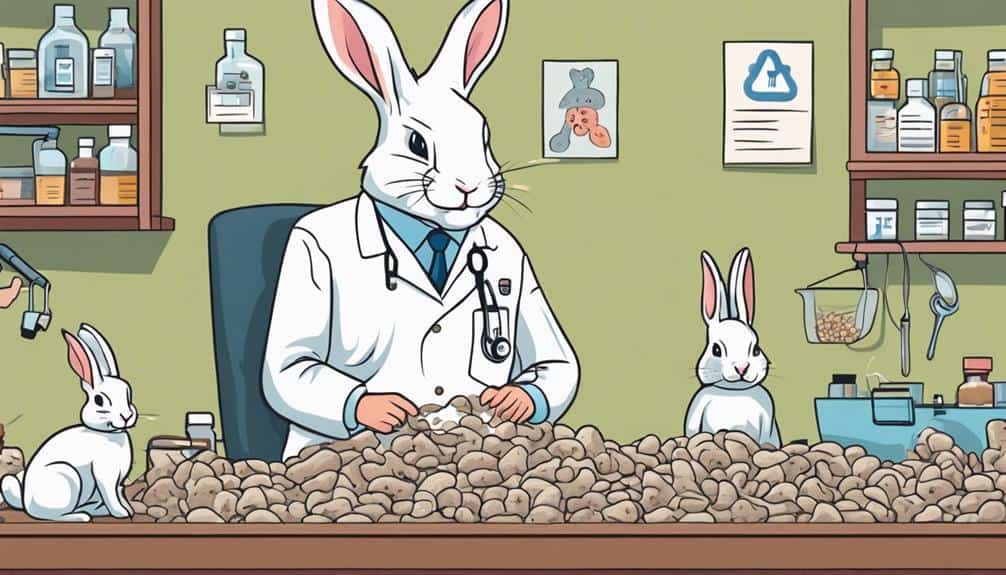
Keep an eye on your bunny's poop to catch any health issues early on. Changes in your rabbit's poop can signal gut problems, like differences in frequency, texture, and appearance. If you notice sticky, matted, less poop or concerning changes, it's time to see the vet.
Any odd behaviors like changes in color, texture, or frequency should make you book a vet visit right away. Getting professional help for bunny poop issues ensures the right diagnosis and treatment to keep your pet healthy. A vet can quickly address any abnormalities and maintain your rabbit's overall health.
Frequently Asked Questions
How Long Can a Bunny Go Without Pooping?
If your bunny doesn't poop, it could harm their digestive system. Make sure your bunny keeps pooping regularly to avoid any problems. Keep an eye on what they eat, how much water they drink, and how active they are to keep them healthy and prevent any issues.
Do Rabbits Have a Pooping Schedule?
Have you ever wondered if rabbits have a specific pooping schedule? Let's dive into it! The consistency, frequency, and color of their poop can actually tell us a lot about their health. By keeping an eye on these factors, we can make sure our bunnies stay healthy and happy.
How Long Do Rabbits Poop After Eating?
After a rabbit eats, they usually poop within a few hours. The timing of their pooping is based on what they eat and how their digestion works. It's good to keep an eye on the consistency of their poop after meals to check on their health. Any changes could mean there are digestive problems that need attention.
How Much Does a Rabbit Poop a Day?
If you want to keep your bunny healthy, it's important to pay attention to their poop. A rabbit can make around 200-300 poop pellets every day, depending on what they eat and how big they are. By keeping an eye on the frequency and consistency of their poop, you can make sure your furry friend is in good shape.
Conclusion
So, bunnies poop a lot, like multiple times a day. What they eat, how much water they drink, and their health can all affect how often they go.
Keeping an eye on your bunny's poop can tell you a lot about how they're doing overall. If their poop looks off, it could mean they're not feeling well, so it's smart to talk to a vet.
Basically, bunnies are poop machines, constantly making those little pellets like it's nobody's business!

